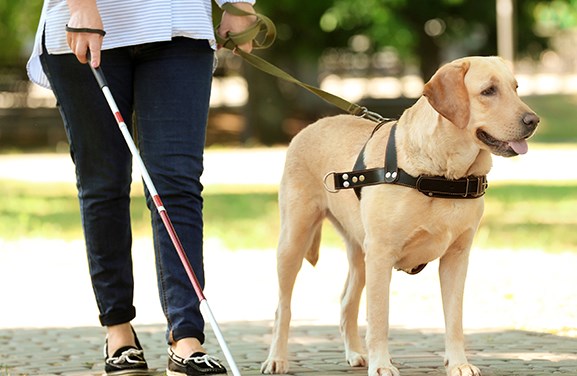A mother arrives at a family restaurant in Regina with her husband and their children — but before they can enjoy some family time, they’re denied entry.
Returning home from a business trip to Toronto shortly after midnight, a woman arrives at Halifax Stanfield International Airport, where a cab driver refuses her service.
On a celebratory road trip after graduating from law school, a man stops at a Shell gas station in Kamloops, where the cashier refuses to sell him coffee and demands that he leave immediately.
Each of these stories is true. The common factor? They all involved people who are blind, accompanied by a guide dog.
Although it’s illegal in Canada to deny access or refuse service to a person who is working with a guide dog, it happens far too frequently.
In all of Canada’s 13 jurisdictions, legislation prohibits discriminating against a person with a disability who’s working with a service animal. Discrimination includes denial of access to any premises to which the public would normally have access.
Unfortunately, discrimination continues to happen because people — like the restaurant employee, the taxi driver and the Shell gas station cashier — are unaware of the laws that protect guide-dog teams in Canada.
Shockingly, during the gas station incident, when Kamloops RCMP arrived, the guide-dog handler believed the officers would enforce the law and his right to be there. Yet he was handcuffed, arrested and put into the back of the police cruiser.
In a recent CNIB Foundation survey of guide dog teams in Canada, participants felt that when they’ve asked for support from police in cases of discrimination, the police were not familiar with the laws protecting guide dog teams and did not enforce them.
After the taxi incident, Halifax Regional Police were unaware that it was their job to enforce the law. (They know now.)
Having a guide dog is a transformational experience. Being part of a guide-dog team provides mobility, safety and confidence, leading to increased independence and a sense of connection with the world around you.
From my own experience eating at restaurants, shopping at stores, staying at hotels and travelling from one place to another with my guide dog, Alan, I can say wholeheartedly many businesses are welcoming to guide-dog teams.
But like so many other Canadians who rely on guide dogs, I still encounter discrimination — often rooted in ignorance.
Businesses need to familiarize themselves with the laws that affect them and they need to uphold these laws — or it could be costly for them. Penalties under human-rights legislation in Canada range from $100 to $10,000.
They should also understand the differences between guide dogs, other service dogs, therapy dogs and emotional-support dogs — which ones are protected by provincial legislation and which ones are not.
Businesses must educate their employees about these laws and be aware of situations when it would be appropriate to ask a person who is accompanied by a dog to leave.
At a time when federal, provincial and municipal governments and communities are focusing on accessibility and inclusion — and smashing barriers that stand in the way of Canadians with disabilities — it’s time for businesses to step up and do their part.
For more information about legislation that protects guide-dog teams, visit guidedogchampions.ca.
Victoria Nolan is the head of stakeholder relations and community engagement for CNIB Guide Dogs.



